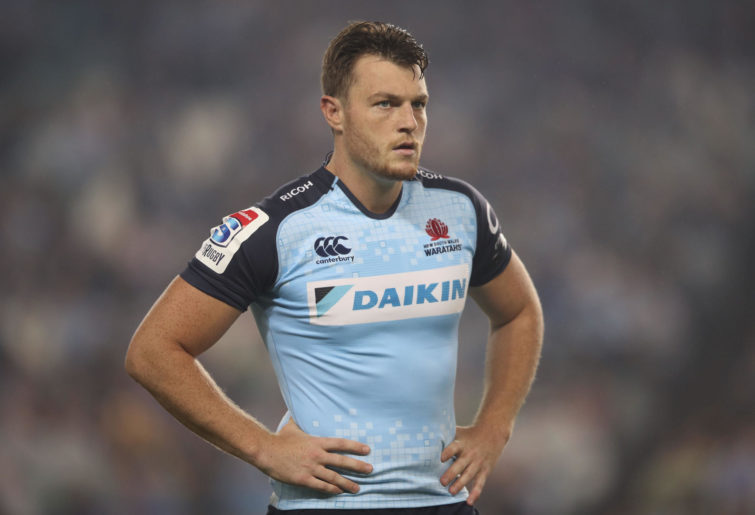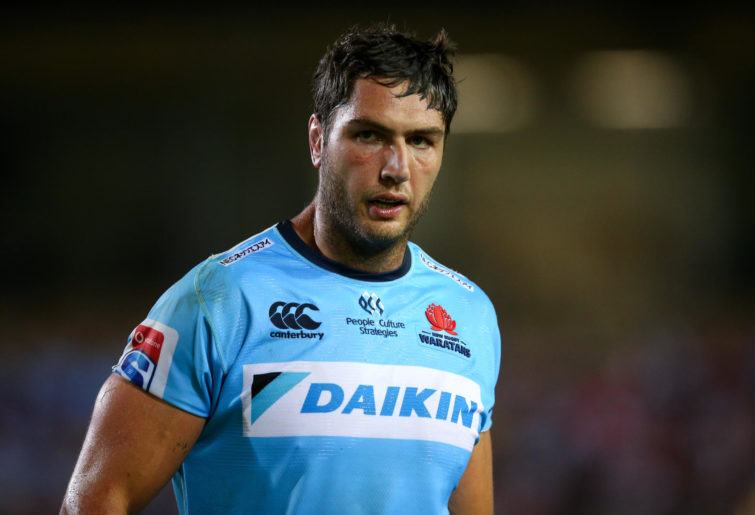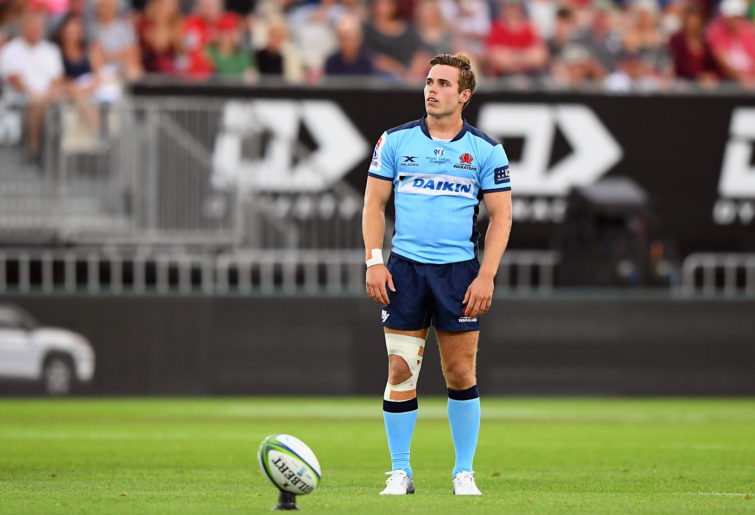The NSW Waratahs (12) were out-muscled and out-scored five tries to two in wet conditions at Newcastle by an Auckland Blues side (32) that struggles to win away matches.
The thin crowd of 7491 spectators, the lowest for a Waratahs home game ever, saw their side smashed in the scrums, beaten in the breakdowns and torn to shreds in occasional Blues try-scoring breakouts.
The smallest crowd record was matched with another disastrous new record: this is the first time since Super Rugby started that the Waratahs have lost their first two opening matches of the tournament.
The new season is shaping up to a lost enterprise with indecent haste, with next weekend’s match against the Rebels at Melbourne a possible campaign-ending match for both sides.
The decision-making by the Waratahs leadership group at Newcastle was built, it seemed to me, on the belief that this generation of players can do anything they aspire to achieve, even when the evidence suggests they are living in fantasy land.

(Mark Kolbe/Getty Images)
Example: with the scoreline 20-7 early on in the second half the Waratahs won a penalty in front of the Blues posts.
In the Fox Sports box Rod Kafer was virtually yelling out for the Waratahs to tap and run.
Playing on or even converting the easy penalty was the obvious way to put the Blues under points pressure and avoid the clear risk of a Blues scrum, augmented by two fresh All Blacks in the front row, to once again smash a fragile Waratahs scrum.
So what does the Waratahs captain Rob Simmons do? He calls for a scrum.
And what happens to the Waratahs scrum? The Waratahs scrum is smashed.
The referee, who was somewhat generous to the Waratahs scrum problems throughout the match, had no option but to award the Blues a penalty and the welcome chance to clear the pressure from their tryline.
The Blues scored two tries in the first four minutes of the second half. They held the Waratahs to a single try when they had their impressive No. 8 Hoskins Sotutu sin-binned. They then scored two more tries in the last three minutes of the match to grab an unexpected bonus point.
What this reading of the match suggests – or, more accurately, proves – is that the Blues showed more rugby nous, more guts, more justified self-belief than the Waratahs.
And in a roundabout way this reading is supported by the bleak review offered by the clearly disappointed new Waratahs coach, Rob Penney.
“I thought our defence was a bit vulnerable,” he said. “We’re nowhere where we need to be with that. We’ve got to show some resilience. We can’t drop our lip and hide from the fact we aren’t anywhere where we needed to be today and step forward with the desire and accuracy we need to bring to the game …”
Penney’s summary was matched by Rod Kafer’s damning and accurate indictment of the lethargic play of the Waratahs as early as the first half of the match.
“There’s no real effort off the ball from the Waratahs,” he said. “I can see lots of the guys walking. They’re slow, lethargic and there’s not the spring in the step that you expect in your first home match.”
So what was the reaction of the Waratahs captain Rod Simmons to the criticism that his team lacked resilience and energy?
Total woke-speak, I’m afraid.
“I don’t think we went out there and did what we said we were going to do, which was disappointing. We let their individuals come into the game. We’re all learning how to work this stuff out. We’ll start again next week and see what happens.”
Now ‘woke’ has many different meanings. But in this article I am using a definition from Grazia magazine: “Veering into joke territory … as a way of mocking people and ideas that over-analyse relatively benign things and topics.”
It was clear to Rod Kafer and coach Rob Penney that the Wallabies lacked resilience and energy.
But to Simmons, speaking for his players, it was much more complicated than that, although what those complications were he never explained.
In other words, he over-analysed – “we’re working all that happened out in our minds” – what was an obvious failure by his team in order to come up with a lame excuse for the team’s poor and unacceptable performance.
I am afraid too that this woke reaction by Rob Simmons is being endorsed by Rugby Australia.

(Jason McCawley/Getty Images)
Jessica Halloran, the chief sports writer for The Australian, had a fascinating article in the Saturday edition – ‘No-score kids’ sport “misses the point”‘ – that goes to the heart of the problem facing the Waratahs and many other aspects of Australian rugby.
The opening paragraphs of the story provide the basis for its headline.
“The junior football season is just around the corner, but with the banning of scoreboards, sports experts are worried that children are no longer being taught how to handle losing on and off the field.
“In entry-level versions of Australian rules, rugby league, soccer and rugby union, there are no finals, no ladder and no scores.
“Premiership winning coaches and psychologists alike believe the result of this edit is that children won’t learn to build resilience or experience adversity.”
Junior rugby, for example, does not have any scores, finals, ladders or any real competition on the field until age ten.
The general manager of Rugby Australia’s Community Rugby program, James Selby, is quoted by Halloran as justifying this policy on these grounds: “People say we are taking the competition out of sport, but that is not we are doing.
“It is the emphasis on winning we need to think about – how much time after the game those kids spend thinking about that, and the pressure that is placed on them by adults …
“What can happen is that kids develop a risk aversion and don’t want to try things and make mistakes which they can learn from. They don’t want to get in trouble for failing.”

(Kai Schwoerer/Getty Images)
This is woke nonsense. It over-analysis what sport is about in a way that trivialises its character-building qualities.
Sport is life without, generally, any real consequences of getting things wrong. It teaches – or it should teach – particularly youngsters that you don’t achieve success without putting in the hard work and by being resilient, brave, committed, smart and technically correct.
Children – and older players, for that matter – do not improve if the competitive aspect of sport is downplayed. The points system in sport actually encourages improvement.
Jessica Halloran quotes a leading child and adolescent psychologist Michael Carr-Gregg disputing the validity of the ‘no-score’ sports programs: “What these codes have done with this edict – we are going to make sure these kids don’t feel sadness or disappointment.
“It’s not just not scoring, they don’t keep ladders, there are no finals, this is the wussification of an entire generation of children.”
AFL great Kevin Sheedy is quoted too, arguing that this wussification robs children of essential life lessons: “Losing in sport teaches people to handle the loss of relationships, health issues or a job. It’s good to understand how to lose, and sometimes your disappointments become your strengths.”
Rugby Australia’s James Selby says, however, that he has read “significant research” from the Canadian professor Jean Cote and the University of Queensland professor Cliff Mallett that “supports focussing on fun, rather than keeping the score”.
I looked up Cliff Mallett and found that his main research program is in two broad areas: sport psychology and coaching, with the specific areas of interest within the framework of self-determination theory (SDT), especially involving elite athletes and their coaches.
Professor Cote has published a paper called Youth Sports: Implementing Findings and Moving Forward with Research.
This research is actually a compilation of a number of research papers – an overview of the state of the current research, according to Professor Cote.
From this compilation Cote derives a number of what he considers are implications for “future directions for researchers”.
Among these implications is a consideration of the impact on being involved with sports programs for those youngsters who are not going to become elite athletes.
Cote’s conclusion is that “if researchers and practitioners work together in a collaborative manner, it is more likely youth will experience positive outcome through sport”.
It seems to me that rather than being “significant”, as James Selby argues, Cote’s paper makes the usual call by an academic for more money for further research.
This brings us back to the agnostic psychologist Michael Carr-Gregg, who told Jessica Halloran that he had never seen a “double-blind controlled peer-reviewed study” to support dumping finals from junior sport.
“We’ve got to build resilience,” he said. “We’ve got to allow kids to experience adversity.”
And, in turn, come back back to the Waratahs and their poor start to the 2020 Super Rugby season.
Many of the Waratahs, who were according to their coach lacking in “resilience,” are the product of Rugby Australia’s no-score early rugby programs.
They were terrific, though, in signing autographs and taking selfies with the fans after the game despite the cold and the rain. So that’s all right then.































































































